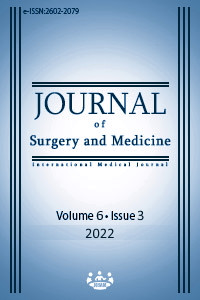Estimated glomerular filtration rate decreased by Hydroxyethyl Starch in isolated coronary artery bypass graft surgery: A retrospective cohort study
Keywords:
Coronary artery bypass graft, Colloids, Hydroxyethyl starch 130-0.4, Glomerular filtration rateAbstract
Background/Aim: Hydroxyethyl starches have been widely used to replace the intravascular volume. They increase the risk of renal injury in critically ill patients. In cardiac surgery, patients are at risk for cardiac surgery-associated acute kidney injury. This study aims to analyze the renal functions in coronary surgery with hydroxyethyl starches and crystalloids. Methods: Patients who underwent isolated on-pump coronary artery bypass graft surgery between January 2017 and June 2019 were included in the study. They were categorized into two groups according to intraoperative volume replacement therapy. The non-HES group consisted of patients who had been given a balanced electrolyte solution; the HES group consisted of patients who were administered a balanced electrolyte solution and 500 ml of hydroxyethyl starch solution. A two-sided P-value of <0.05 was considered significant. Results: There were no significant differences between the two groups in terms of demographic values and preoperative serum urea, creatinine, blood urea nitrogen, and estimated glomerular filtration rate levels (P>0.05). In the HES group, the postoperative value of creatinine was significantly higher and estimated glomerular filtration rate level was significantly lower compared to the preoperative values (P<0.001). Conclusion: The intraoperative administration of 500 mL hydroxyethyl starch affected renal function in isolated on-pump coronary artery bypass graft surgery patients.
Downloads
References
Gillies MA, Habicher M, Jhanji S, Sander M, Mythen M, Hamilton M, Pearse RM. Incidence of postoperative death and acute kidney injury associated with i.v. 6% hydroxyethyl starch use: systematic review and meta-analysis. Br J Anaesth. 2014 Jan;112(1):25-34. doi: 10.1093/bja/aet303.
Bayer O, Schwarzkopf D, Doenst T, Cook D, Kabisch B, Schelenz C, et al. Perioperative fluid therapy with tetrastarch and gelatin in cardiac surgery--a prospective sequential analysis. Crit Care Med. 2013 Nov;41(11):2532-42. doi: 10.1097/CCM.0b013e3182978fb6.
Reinhart K, Perner A, Sprung CL, Jaeschke R, Schortgen F, Groeneveld BJ, et al. European Society of Intensive Care Medicine. Consensus statement of the ESICM task force on colloid volume therapy in critically ill patients. Intensive Care Med. 2012 Mar;38(3):368-83. doi: 10.1007/s00134-012-2472-9.
Martin C, Jacob M, Vicaut E, Guidet B, Van Aken H, Kurz A. Effect of waxy maize-derived hydroxyethyl starch 130/0.4 on renal function in surgical patients. Anesthesiology. 2013 Feb;118(2):387-94. doi: 10.1097/ALN.0b013e31827e5569.
Tobey R, Cheng H, Gao M, Li Z, Young N, Boyd D, et al. Postoperative Acute Kidney Injury and Blood Product Transfusion After Synthetic Colloid Use During Cardiac Surgery. J Cardiothorac Vasc Anesth. 2017 Jun;31(3):853-862. doi: 10.1053/j.jvca.2016.12.024.
Chew STH, Hwang NC. Acute Kidney Injury After Cardiac Surgery: A Narrative Review of the Literature. J Cardiothorac Vasc Anesth. 2019 Apr;33(4):1122-1138. doi: 10.1053/j.jvca.2018.08.003.
Hüter L, Simon TP, Weinmann L, Schuerholz T, Reinhart K, Wolf G, et al. Hydroxyethylstarch impairs renal function and induces interstitial proliferation, macrophage infiltration and tubular damage in an isolated renal perfusion model. Crit Care. 2009;13(1):R23. doi: 10.1186/cc7726.
Strunden MS, Bornscheuer A, Schuster A, Kiefmann R, Goetz AE, Heckel K. Glycocalyx degradation causes microvascular perfusion failure in the ex vivo perfused mouse lung: hydroxyethyl starch 130/0.4 pretreatment attenuates this response. Shock. 2012 Nov;38(5):559-66. doi: 10.1097/SHK.0b013e31826f2583.
Van Der Linden P, James M, Mythen M, Weiskopf RB. Safety of modern starches used during surgery. Anesth Analg. 2013 Jan;116(1):35-48. doi: 10.1213/ANE.0b013e31827175da.
Momeni M, Nkoy Ena L, Van Dyck M, Matta A, Kahn D, Thiry D, et al. The dose of hydroxyethyl starch 6% 130/0.4 for fluid therapy and the incidence of acute kidney injury after cardiac surgery: A retrospective matched study. PLoS One. 2017 Oct 18;12(10):e0186403. doi: 10.1371/journal.pone.0186403.
Coleman MD, Shaefi S, Sladen RN. Preventing acute kidney injury after cardiac surgery. Curr Opin Anaesthesiol. 2011 Feb;24(1):70-6. doi: 10.1097/ACO.0b013e3283422ebc.
Kindzelski BA, Corcoran P, Siegenthaler MP, Horvath KA. Postoperative acute kidney injury following intraoperative blood product transfusions during cardiac surgery. Perfusion. 2018 Jan;33(1):62-70. doi: 10.1177/0267659117712405.
Karkouti K. Transfusion and risk of acute kidney injury in cardiac surgery. Br J Anaesth. 2012 Dec;109 Suppl 1:i29-i38. doi: 10.1093/bja/aes422.
Downloads
- 365 457
Published
Issue
Section
How to Cite
License
Copyright (c) 2022 Muharrem Koçyiğit, Özgen Ilgaz Koçyiğit
This work is licensed under a Creative Commons Attribution-NonCommercial-NoDerivatives 4.0 International License.
















